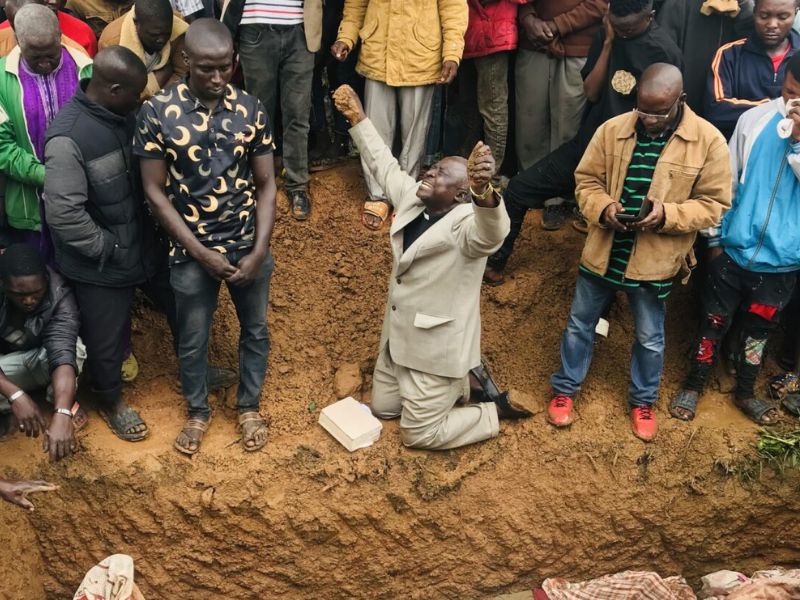The Rev. Ezekiel Dachomo, a respected clergyman with the Church of Christ in Nations (COCIN), has issued an urgent appeal to the United States government and the international community to intervene and halt what he describes as an ongoing genocide against Christians in Nigeria’s Middle Belt.
Dachomo’s plea follows a fresh wave of coordinated attacks by armed Fulani extremists on Oct. 14, in Barkin Ladi Local Government Area (LGA) of Plateau state, which left at least 13 Christians dead, several injured, and many displaced.
Speaking to International Christian Concern (ICC) after the mass burial of the victims in Rachas village, Dachomo expressed deep frustration over the continued slaughter of Christians across Plateau state and northern Nigeria. He accused the authorities of complicity and denial in the face of overwhelming evidence of targeted violence.
“If telling the truth will cost me my life, then I have chosen to die telling it,” he said. “There is a genocide going on in Nigeria, and the world must hear about it. Christians are being hunted, killed, and displaced because of their faith, yet the government remains silent or even protects the perpetrators.”
According to eyewitness accounts, the coordinated assaults began at night when armed Islamic Fulani militants invaded the Christian villages of Rawuru, Tatu, and Lawuru in Barkin Ladi. The attackers stormed a mission center in Rawuru during evening prayers, shooting indiscriminately and killing worshippers. Two people were confirmed dead, while others fled into nearby bushes.
The militants then advanced to Tatu, where 10 Christians were executed, livestock looted, and homes set ablaze. In Lawuru, two more were killed and farmlands destroyed. More than 38 cows were stolen, and vast areas of cultivated land were ruined.
Residents said they had warned the security forces days before the attacks, but no preventive action was taken.
“We informed the authorities that our communities were under threat,” a church elder in Rawuru said. “But no one came to our aid. Now we are burying our loved ones.”
The tragedy in Barkin Ladi reflects a disturbing pattern of targeted attacks against Christian farming communities across Nigeria’s Middle Belt, particularly in Plateau, Benue, Kaduna, and Taraba states.
For more than a decade, these assaults — often carried out by armed Islamic Fulani extremists — have claimed thousands of lives and displaced countless families. Despite the consistent pattern of Christian victimization, the federal government continues to frame the crisis as “clashes” between farmers and herders, a narrative survivors and faith leaders reject as deceptive and dangerous.
Dachomo also revealed that he was recently accused by soldiers from the Nigerian Army’s Sector 4 in Barkin Ladi of inciting unrest simply for warning about impending attacks.
“They accused me of knowing about the attack before it happened, just because I raised an alarm,” he said. “Instead of protecting us, they label us the problem. How can we trust a system that accuses victims instead of helping them?”
At the mass burial, the executive chairman of Barkin Ladi LGA, the Hon. Stephen Gyang Pwajok, condemned the attacks and described them as an attempt to displace indigenous Christian communities from their ancestral lands.
“These are unprovoked assaults,” he said. “Our people are being systematically wiped out. This cannot continue.”
Da Paul Tadi-Tok, the district leader of Heipang, called for the revival of Operation Rainbow, a community-based security initiative in Plateau state, stressing that local defense systems have proven to be the most effective in protecting rural communities.
Brigadier General Shippi Gakji Goshwe (Rtd.), security adviser to the Plateau state governor, confirmed that recruits were undergoing training under Operation Rainbow to strengthen rural surveillance and response. However, community members remain skeptical, citing years of unfulfilled promises and recurring violence.
Dachomo, known for his fearless advocacy on behalf of persecuted Christians, said both he and investigative journalist Masara Kim have become targets for exposing the truth.
“We are now marked men,” he said. “But I will not be silent. The God who healed me from cancer in India will also save me from the cancer of terrorism destroying Nigeria.”
He appealed directly to U.S. President Donald Trump and the international community to take decisive action.
“The genocide against Christians in Nigeria must stop,” he said. “The world cannot continue to look away.”
The ongoing violence has created a worsening humanitarian crisis. Thousands of displaced families now crowd into temporary camps and church compounds with little access to food, healthcare, or shelter. Local churches and humanitarian groups are overwhelmed, calling for international aid and justice mechanisms to investigate and prosecute those responsible.
As the sun set over Rachas village, the cries of mourning families echoed through the air. Thirteen wooden coffins lay side by side, symbolizing not just the loss of lives but the erasure of entire communities. Standing among the mourners, Rev. Dachomo’s voice trembled with emotion but remained anchored in faith.
“We are not giving up,” he said. “Our blood cries for justice, and one day, justice will come. But until then, we ask the world to see us, to hear us, and to help us.”
To read more news stories, visit the ICC Newsroom. For interviews, please email [email protected]. To support ICC’s work around the world, please give to our Where Most Needed Fund.






